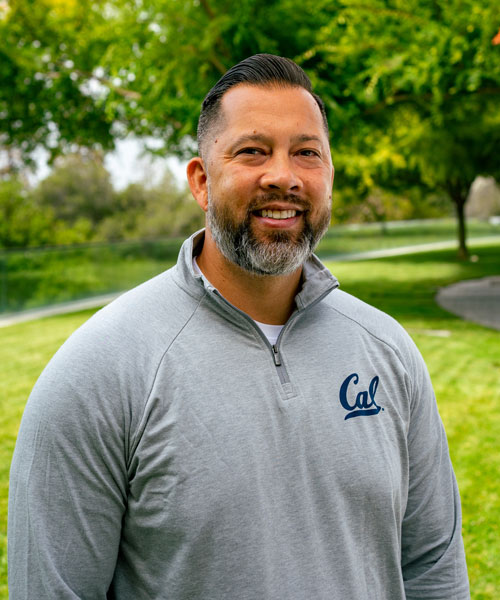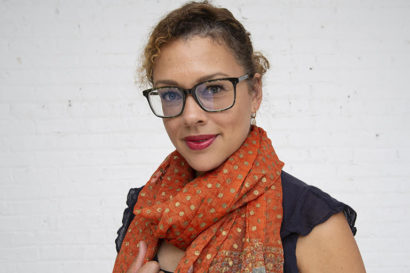Breaking the cycle of shame about mental struggles in athletics
College athletes learn to take seriously their mental health and step up self-care

September 20, 2021
Long before sports superstars Naomi Osaka and Simone Biles braved the spotlight to defend their mental health, Graig Chow, a certified mental performance consultant at UC Berkeley, studied the culture that pushes elite athletes like NBA players Chamique Holdsclaw, Kevin Love and DeMar DeRozan to their breaking points.

Graig Chow, Cal Athletics director of high performance and well-being. (UC Berkeley photo by Neil Freese)
What he found was a top-down global sports establishment that has trouble differentiating between competitive anxiety and clinical mental disorders.
By the time top athletes bow out of competitive events due to mental health struggles, they’ve likely endured years of stigma-induced shame, said Chow, the director of high performance and well-being at UC Berkeley’s Cameron Institute for Student-Athlete Development.
But how to stand up to a traditionally unforgiving culture, especially for college athletes who don’t possess the star power of Osaka, a Japanese four-time Grand Slam champion in tennis and Biles, an American Olympic gold medalist in gymnastics?
“To stand up and advocate for yourself is hard when you’re depressed or feeling highly anxious, and when there’s so much on the line,” said Chow. “That’s why we need to take ownership — as athletic directors, coaches and support staff — to release some of that burden, so that we’re looking out for these young athletes and not expecting them to do it all on their own.”
At UC Berkeley, Chow has launched a mental health literacy and destigmatization program targeted at all UC Berkeley student-athletes and staff based on research he conducted as an assistant professor of sports psychology at Florida State University.
“We know that stigma is the main barrier to seeking help, but not a lot has been done with athletes in terms of anti-stigmatization programs,” he said. “And so, I’m really excited that we’re pioneering this at UC Berkeley.”
Pressure to be No.1
The four-session program got off to a slow start due to the COVID-19 pandemic, but is sure to pick up the pace in the spring when it moves to an in-person curriculum. It’s particularly relevant for student-athletes at UC Berkeley, Chow said.
“They’re at the No.1 public university in the country and trying to compete at a high level. But they also have a personal life, and trying to balance those things is hard,” said Chow, who works one-on-one with student-athletes at Berkeley, as well as with professional athletes, at his private practice.
Among other strategies, Chow uses empathy exercises to put athletes and their handlers in the shoes of peers who have struggled with mental health issues. Empathy, Chow found, is among the most effective ways to get athletes to normalize a stigmatized group or condition, reflect on their own challenges and, if needed, seek treatment.
He also uses athletes’ intrinsic competitiveness to motivate them to step up their self-care regimen, get eight hours of sleep at night and take restorative breaks throughout the day. As for role models, he talks about celebrity athletes who take their self-care very seriously.
“LeBron James spends over $1 million every year on restorative techniques,” he said. “Michael Phelps uses the Ferrari analogy. If you drive it hard all day long, eventually you have to park that Ferrari and let it rest, let it cool down, make sure you’re fueling it back up with 91 unleaded, not 87.”

Ezinne Abba, a Cal Track and Field sprinter and senior majoring in molecular and cell biology, has managed the pressures of competitive athletics and academics, thanks to a diverse network of support. But she’s also seen fellow student-athletes drained of their mental and physical energy and quit under the strain.
“Being a student-athlete at UC Berkeley can be emotionally demanding, and taxing on your body. It’s just very hard to adjust to the rigors of a demanding practice schedule and really harsh courses,” said Abba, who broke a school record last May by running 100 meters in 11.30 seconds. “There are still times where I feel like I need to take a day off, when I need a muscle break.”
She attributes much of her success to peer camaraderie, the Fannie Lou Hamer Black Resource Center and supportive parents, professors and coaches who are flexible when the dueling demands on her time get to be too much. Coaches, she said, can make or break an athlete’s spirit, and so it’s important that they practice empathy.
A burden on Black female athletes
Being among the few Black students, Black women and Black athletes in her major makes her feel isolated at times, she added.
“Sometimes, people in my major will assume, ‘Oh you’re an athlete. That’s why you’re here.’ It’s like they’re saying: ‘Are you sure you want to be here?’” said Abba. “Different people have stereotypes about Black women who are athletes, and I feel like they perceive us all as being the same, but we’re not.”

Tennis star Naomi Osaka pulls out of the French Open after being fined for skipping a news conference. (Photo by John Nacion/Star Max/IPx)
Global awareness of elite athletes’ mental fragility intensified this summer with Osaka’s sudden withdrawal from the French Open and Wimbledon due to mental health concerns. It was further amplified by Biles’ early departure from the Tokyo Olympics when she lost her bearing while in the air due to a perception disorder known as the “twisties.”
Their decisions to pull out of the crème de la crème of world-class competitions divided the sports establishment, the news media and fans, in general. While some sympathized with their predicaments, others condemned them for reneging on their obligations as highly paid athletes and public figures.
“This polarization underscores the different ways that athletes and people, in general, deal with overwhelming pressure,” said Adrian Aguilera, a clinical psychologist and UC Berkeley social welfare professor. “Ultimately, we need to accept athletes as being human and inherently imperfect, and that it’s OK.”
UC Berkeley social welfare professor Tina Sacks, a former NCAA Division 1 tennis player at Chicago’s DePaul University, applauds Osaka and Biles for publicly sharing their vulnerabilities.
Black female athletes, particularly those who break into predominantly white sports like tennis and gymnastics, are under more pressure to perform and conform, she noted.
And so, “to be able to say, ‘Listen, I’m not going to break my neck if I am not able to perform these feats. I’m not going to risk becoming paralyzed or killing myself for someone else’s pleasure or for this sort of capitalist machine that just eats up women’s bodies — and Black women’s bodies, in particular’ — is groundbreaking,” Sacks said.
In the early 1990s, Sacks put in long hours of training, travel and tournaments for the Blue Demons women’s tennis team while maintaining a scholarship-worthy GPA. But the pressures she faced pale in comparison to what today’s athletes endure under the glare of 24/7 social media and what’s at stake if they speak out, she said.

Tina Sacks, social welfare professor and former Division 1 tennis player. (Photo by Carlos Javier Ortiz)
“It takes a next-level kind of bravery to do what Naomi Osaka and Simone Biles did, but most athletes cannot afford to be that revolutionary,” said Sacks. “Why aren’t there more Colin Kaepernicks? Because it takes a really extraordinary person to be able to buck the whole system, and there just aren’t that many people able to do that.”
Gen Z more open to change
UC Berkeley psychology professor Stephen Hinshaw, a leading expert on the stigma of mental illness, published in 2017 Another Kind of Madness, an award-winning memoir about his own family’s struggle with his father’s hidden bipolar disorder.
He noted that competitive athletes are particularly susceptible to anxiety, depression and self-harm because they’re repeatedly told that losing is not an option.
“That ‘sacrifice at all costs’ mentality leads too often to physical and mental exhaustion and a sense that one is worthless unless they’re at the pinnacle,” Hinshaw said. “Yet, in psychology, we know that most people thrive when there’s intrinsic motivation, as opposed to being pulled by a set of nearly impossible expectations.”
That said, Hinshaw is optimistic that Generation Z, whose peers and role models include Osaka and Biles, is key to overcoming stigma because, compared to previous generations, Gen Zers are more comfortable sharing their vulnerabilities.
“We’re on the verge of a sea change, in terms of young people’s greater acceptance of behavioral and emotional differences and a greater emphasis on disclosure and genuineness that can surge upward to older generations,” he said.
But that doesn’t mean the problem will resolve itself without interventions, warned Hinshaw and Chow. Hence, the need for comprehensive training in mental health literacy, destigmatization and wellness practices for everyone in the athletics hierarchy.
“Superstar athletes like Simone Biles and Naomi Osaka can keep competing, despite withdrawing for mental health reasons, but that privilege is not usually afforded to college athletes who are beholden to coaches and multiple stakeholders,” Chow said. “That’s why change has to start at the top. Only then will we see a cultural shift.”
